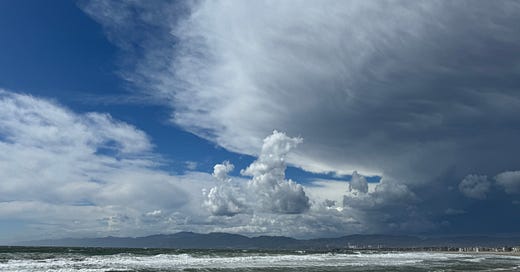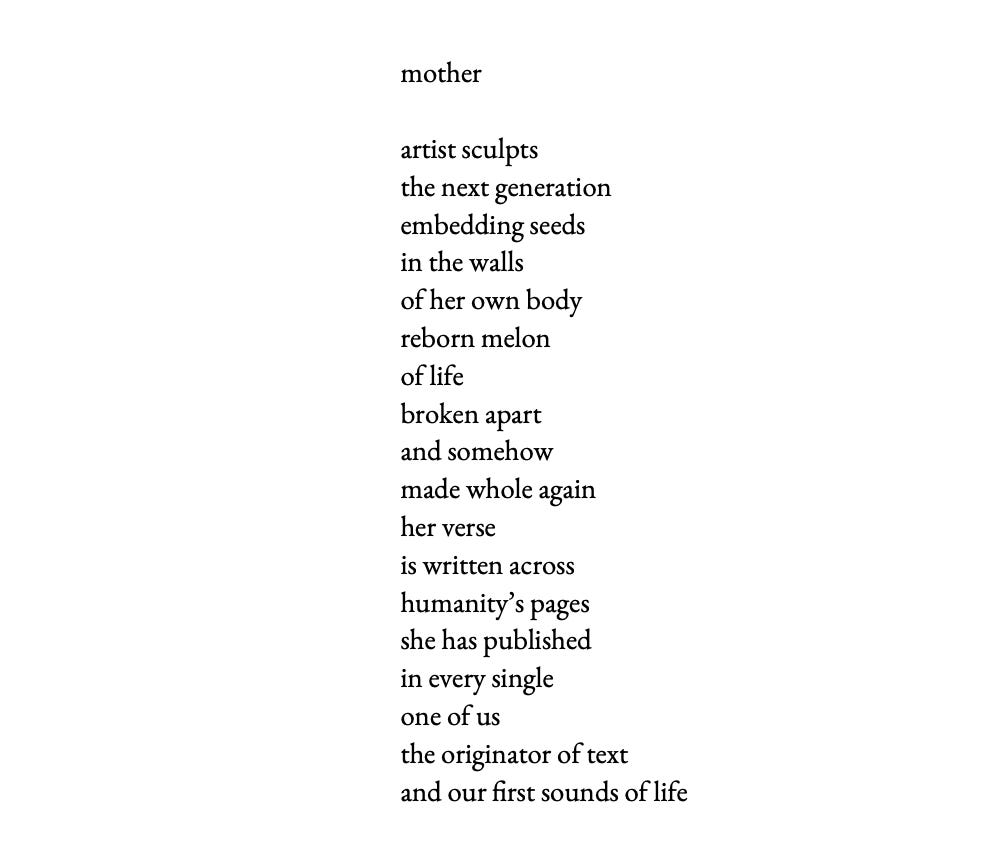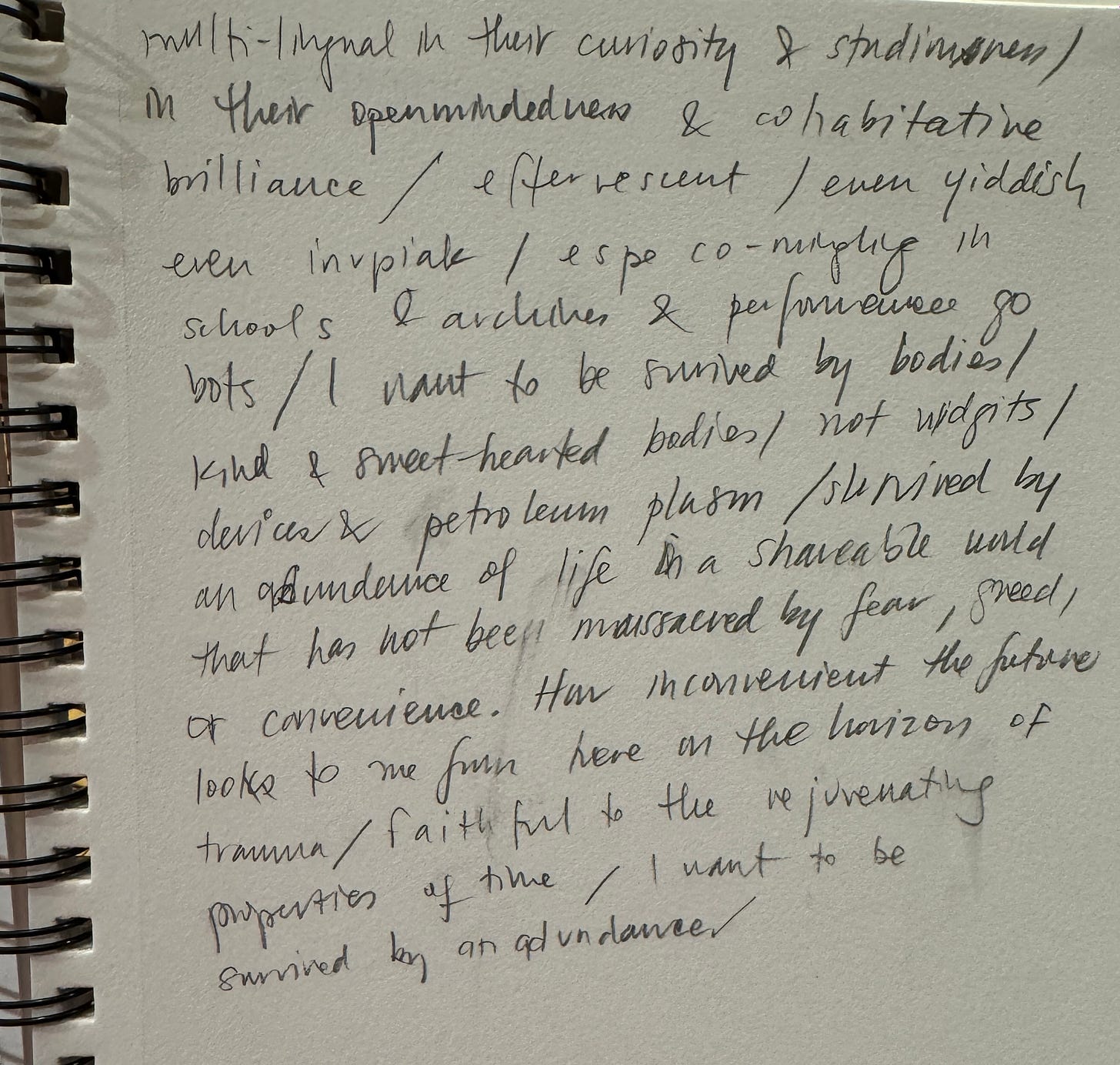Women's History Month Reflections
Dear Fellow Mammals,
Thank you for all that you do to stay balanced inside yourself, your family, and communities. Thank you for all the good that you choose to do in the spaces you touch!
I hope that you have had an inspiring Women’s History Month. Why only one month for half the global population, you may ask? Let’s make it a year. Why not a century?
This post shares my behind-the-scenes reflections that shaped the poetry readings I gave honoring Women’s History Month. I’m grateful to everyone who invited me to read poems and connect in community. I spoke at bookstores, for writers associations, and groups that are working to build a just economy.
I am a teaching poet. One of my goal’s this year is to visit and connect with more communities by offering readings with workshops and residencies. Reach out to me to dream up a collaboration! Here are two testimonials from this month.
“In a world often divided by borders and barriers, Dr. Amy Shimshon-Santo's multilingual reading served as a reminder of our shared humanity. IWWG was delighted to feature Amy at our global open mic. Her performance was a celebration of multiplicity and the beauty of linguistic expression.”
International Women Writer’s Guild
“Amy and I collaborated on a public reading for my debut poetry collection. The vibrancy Amy brought to the space was one-of-a-kind; it really felt like she was channeling the divine from that lectern, weaving sonic hypnosis with deep knowledge of language, history, and faith. “
Ivy Raff, Writer
Before We Get Started
SUBMISSION DEADLINE TO LIBRETTO MAGAZINE APPROACHES! The submission deadline for poems, essays, and art work to Libretto Magazine is March 31! [Music on this post is by my son Avila Santo. It’s called Groove!]
Read more: https://librettong.com/libretto-magazine-call-for.../
Make your submission through the submission portal: https://librettong.com/submission-guidelines/
Check out the International Women Writers Guild for wonderful workshops. They have a conference coming up this summer where I’ll be teaching a Writing Peace workshop.
Here’s a fun interview with Eilen Itzel Mena about her creative process.
Women As Creators
Back in 2011, I wrote a poem that honored the labor of mothers as a creative force. I set the type and printed it on a hefty, iron letterpress machine at the Armory Center for the Arts. It went like this:
The print was shown in an exhibition curated by my mother Bruria for Pacific Standard Time called Breaking in Two. It hung on the wall beside my daughter Reva’s photographs. Breaking in Two felt like an intergenerational, extended-family, community reunion + art extravaganza bursting from within an airplane hangar.
At the time, artist women elders in the show reported having hidden the fact that they were mothers because the so-called “art world” would diminish their lives and work as unserious. Meanwhile, the truth of the matter was that they / we are reproducing the generations, human labor power, and culture at the same time. Impressive!
Creating a Shareable World
Here is the LAPL link to Toni Morrison’s essay collection The Source of Self Regard. In her essay “Cinderella and Her Sisters,” Toni Morrison famously wrote that “the function of freedom is to free somebody else.” She also envisioned personal fulfillment in relation to mutual flourishing. Morrison continued,
“…in your rainbow journey toward the realization of personal goals, don’t make choices based only on your security or your safety. Nothing is safe. That is not to say that anything ever was, or that anything worth achieving ever should be. Things of value seldom are. It is not safe to have a child, It is not safe to challenge the status quo. It is not safe to choose work that has not been done before. Or to do old work in a new way. There will always be someone there to stop you … In wielding the power that is deservedly yours, don’t permit it to enslave your stepsisters. Let your might and your power emanate from that place in you that is nurturing and caring.”
Some people might poo-poo “nurturing” and prefer the idea of being a “boss” or living in perpetual, perhaps even well-deserved anger. For me, after witnessing the trauma of aggression first hand — I want nothing of it. Nurturing and mutuality are my shit.
In Morrison’s essay “Home,” she wrote that “the destiny of the 21st Century will be shaped by the possibility or the collapse of a shareable world.” What if our visions for the future were concordant and mutualistic? What if instead of aggression we elevated shareability?
Seeding Peace
Thich Naht Hanh said that we must have time if we want peace. (Listen to his Peacemaking audiobook at the LAPL or your favorite streaming platform.) If one is devoted to peace, we must also “have time.” He asked us to “struggle with patience.” For as long as I can remember, I learned that “now” is the time. You know the chant: What do we want? [Fill in the blank.] When do we want it?! Now! Working for peace over time humbles me to the greater intergenerational movements of our world. How are we planting seeds for the future today, and watering those seeds? Thinking in this way channels urgency with constancy. It’s like honoring our ancestors while trying to become a good future ancestor at the same time.
Abundance
In Craig Santos Perez’s poem “ginen in your lifetime” he writes a long series of traumatic social events that have occurred in Guam due to abuse of power. (Link to his 2023 book From unincorporated territory [åmot] at the LAPL.) The poet knows that these catastrophic events may never be reversed, yet he ends with the phrase: “the abundance you will be survived by.” Survived by abundance? That line echoed inside me. He concludes with the probability of hope.
We read his poem in class and I assigned the prompt: “what is the abundance you want to be survived by?” Everyone wrote amazing stories and poems that pulled wisdom from a deep sense of time.
My own written response to the prompt banged against the sides of the page, from the left margin to the right. No line breaks or stanzas. It went on for three pages with slashing breaths. Below is a small legible excerpt, an audio note of my first raw draft, and an image of how the letters first appeared on the page.
“I want to be survived humane human beings / multilingual in their curiosity and studiousness / in their openmindedness and cohabitative brilliance / I want to be survived by bodies / not widgets, devices, or petroleum plasm / survived by an abundance of life in a shareable world that has not been massacred by fear, greed, or convenience / How inconvenient the future looks to me from here on the horizon of trauma / faithful to the rejuvenating properties of time / I want to be survived by an abundance / "
Self Care and Social Good
I will share with you a life lesson I learned this month about social change and self care. A friend took my family to the Thien Hau Temple and explained how to meditate in various spaces by reciting our whole names and addresses so the gods would know who we are and where to deliver their blessings. At the first stop, I stated my name and address. After that, without even realizing it, I just prayed everywhere for peace. I forgot to pray for myself at all. I seemed unimportant in relation to the need for peace. This turns out to be foolish.
Who exactly is going to co-create peace but us? Us includes me. (It includes you, so same difference.) It’s my job to pray for, and take care of, myself. So, I recommitted to taking better care of my health. I read The Galveston Diet to reimagine nutrition in midlife.
I began each day with a walk, ideally in an urban park. Breathing in air that trees are touching. Immersing myself in everyday beauty. Becoming curious about the natural world (as a warm-blooded mammal!). I heard song birds with names like bushtit and cowbird. I saw finches and wrens named after houses eventhough they live in eucalyptus trees.
On one hike, I nearly walked into a long, thick rattlesnake undulating its way across a path into the bush. Luckily, I was able to stop in time, be still, and quietly watch it move to safety. The next day, a mourning dove rested beside me holding fibers in its beak. Clearly, this visitor was building a nest. There are lessons everywhere. Danger can pass. We can build safe spaces.
There are lessons everywhere. Danger can pass. We can build safe spaces.






